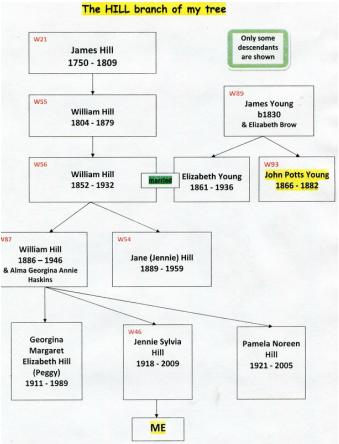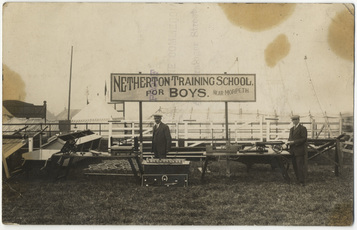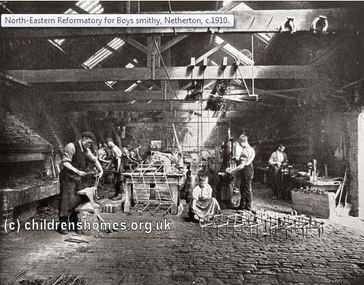I generally choose which ancestor to blog about either by already knowing there is a story to tell and researching them to bring everything up to date OR I make a conscious effort to research a particular person. This blog doesn't fall into either of these categories. I found this story about young John Potts Young by chance while I was word searching his father.

John Potts, as I would like to call him, was born on 26th May 1866. As I described last week, the family were living in Farrington Row by the banks of the River Wear in Sunderland. Far from being idyllic, it was an industrial forest with smoke, dirt and pollution everywhere - not a particularly nice place to grow up. As far as I know, John was the youngest of five children.
I have no idea what motivated John Potts to start stealing but on 2nd February 1880, still thirteen years old, he was arrested. Both he and another youngster, Matthew McCann, were charged with stealing bones. He had been taken into custody on another charge, and while at the police station admitted that, together with McCann, he had stolen last Tuesday a quantity of bones, and sold them for a shilling. The Bench remanded the case.
Five days later on 7th February 1880 the local newspaper reported :
JUVENILE HOUSE BREAKERS AT THE WEST END
William Coulson and John Potts Young, boys on the remand list, were charged with stealing a pair of scissors belonging to the Hetton Coal Company. Mr W. Bell prosecuted.
John Coates, horse keeper to the Hetton Company, identified the scissors produced as his employers property, and said they were worth 2s 6d. He missed them from the company's cabin on the 29th January. P.C. Brebner deposed that he took Coulson into custody at his own house, and found the scissors on the table near to him. Coulson then admitted that he had got the scissors from the Hetten cabin, and that Young, the other prisoner, was with him when he stole them. He afterwards arrested Young, and he also admitted committing the theft. The Bench committed them to prison for 14 days.
Mr Bell said it was the wish of the parents, who were unable to control the prisoners, that a second charge against them was proceeded with separately, viz, that of breaking into a joiner's shop at Messrs Horne and Scott's bottleworks, and stealing therefrom a hatchet, chisel, and screwdriver, worth 5s, on the night of the 28th January, in order that upon conviction for a second offence, they might be committed to Netherton Reformatory.
This case having also been proved, the Bench committed the prisoners to 14 days additional imprisonment, and ordered them to be afterwards kept at Netherton for four years. A third charge against the prisoners of breaking into an office, was not gone into.
I have no idea what motivated John Potts to start stealing but on 2nd February 1880, still thirteen years old, he was arrested. Both he and another youngster, Matthew McCann, were charged with stealing bones. He had been taken into custody on another charge, and while at the police station admitted that, together with McCann, he had stolen last Tuesday a quantity of bones, and sold them for a shilling. The Bench remanded the case.
Five days later on 7th February 1880 the local newspaper reported :
JUVENILE HOUSE BREAKERS AT THE WEST END
William Coulson and John Potts Young, boys on the remand list, were charged with stealing a pair of scissors belonging to the Hetton Coal Company. Mr W. Bell prosecuted.
John Coates, horse keeper to the Hetton Company, identified the scissors produced as his employers property, and said they were worth 2s 6d. He missed them from the company's cabin on the 29th January. P.C. Brebner deposed that he took Coulson into custody at his own house, and found the scissors on the table near to him. Coulson then admitted that he had got the scissors from the Hetten cabin, and that Young, the other prisoner, was with him when he stole them. He afterwards arrested Young, and he also admitted committing the theft. The Bench committed them to prison for 14 days.
Mr Bell said it was the wish of the parents, who were unable to control the prisoners, that a second charge against them was proceeded with separately, viz, that of breaking into a joiner's shop at Messrs Horne and Scott's bottleworks, and stealing therefrom a hatchet, chisel, and screwdriver, worth 5s, on the night of the 28th January, in order that upon conviction for a second offence, they might be committed to Netherton Reformatory.
This case having also been proved, the Bench committed the prisoners to 14 days additional imprisonment, and ordered them to be afterwards kept at Netherton for four years. A third charge against the prisoners of breaking into an office, was not gone into.

From reading this it seems John's parents decided that rather than have him sent to prison for a short period of punishment, he would benefit more by attending a reformatory where he could be taught some skills and perhaps stand a chance in life.
The North Eastern Reformatory in Netherton was sixteen miles north of where his parents lived and was a reformatory for ‘delinquent’ boys aimed at re-educating those who had committed a criminal offence. Parents were expected to make a contribution to the cost of their keep which could have been as much as 5 shillings a week – equivalent to around £22 today. The boys were taught life skills on farms, in workshops and, in John's case, in a blacksmiths.
The North Eastern Reformatory in Netherton was sixteen miles north of where his parents lived and was a reformatory for ‘delinquent’ boys aimed at re-educating those who had committed a criminal offence. Parents were expected to make a contribution to the cost of their keep which could have been as much as 5 shillings a week – equivalent to around £22 today. The boys were taught life skills on farms, in workshops and, in John's case, in a blacksmiths.
 Boys Smithy, Netherton about 1910
Boys Smithy, Netherton about 1910 It must have been much like prison for young James although perhaps he was the sort of lad who needed some structure to his life. After nearly three years he may well have turned a corner and grown out of his 'criminal' tendancies. Sadly, we will never know what he might have made of his life as I discovered that he had died aged just 16 on 11th November 1882. Shockingly, the cause of death was :
"Burns accidentally received through his falling onto the top of a tubular boiler while at work in the Smiths Shop in the said Reformatory. Died instantly."
I've no idea what a "tubular boiler" was but I guess, being in a blacksmiths, it would have been red hot. How can someone accidentally fall on top of one of these ? Was there a lack of supervision ? Was anyone to blame ?
An inquest was carried out on 13th November and his death was certified by the Deputy Coroner for Northumberland, Mr Brewis Elsdon. Determined to find out more, I have been in touch with the Northumberland Archives. Unfortunately only a few inquests survive from that period and John Potts' is not one of them. The Archivist suggested I look in the Morpeth Herald which was the weekly local paper which normally reported inquests for that area. I have word searched and been through every page of the issues where the inquest would have been reported but there was nothing.
Why is there a lack of information ? I know it was a long time ago but knowing how the newspapers loved writing about violent deaths it seems improbable that it was accidentally not reported. Was this something the authorities wanted to hush up ? Whatever the reason, a young sixteen year old boy, however wayward, should not have died while in an institution and there must be some record somewhere to say exactly what happened.
Words in purple are direct quotations from local newspapers.
Photo used with permission : North-Eastern Reformatory for Boys smithy, Netherton, c.1910. © Peter Higginbotham Website : www.childrenshomes.org.uk
"Burns accidentally received through his falling onto the top of a tubular boiler while at work in the Smiths Shop in the said Reformatory. Died instantly."
I've no idea what a "tubular boiler" was but I guess, being in a blacksmiths, it would have been red hot. How can someone accidentally fall on top of one of these ? Was there a lack of supervision ? Was anyone to blame ?
An inquest was carried out on 13th November and his death was certified by the Deputy Coroner for Northumberland, Mr Brewis Elsdon. Determined to find out more, I have been in touch with the Northumberland Archives. Unfortunately only a few inquests survive from that period and John Potts' is not one of them. The Archivist suggested I look in the Morpeth Herald which was the weekly local paper which normally reported inquests for that area. I have word searched and been through every page of the issues where the inquest would have been reported but there was nothing.
Why is there a lack of information ? I know it was a long time ago but knowing how the newspapers loved writing about violent deaths it seems improbable that it was accidentally not reported. Was this something the authorities wanted to hush up ? Whatever the reason, a young sixteen year old boy, however wayward, should not have died while in an institution and there must be some record somewhere to say exactly what happened.
Words in purple are direct quotations from local newspapers.
Photo used with permission : North-Eastern Reformatory for Boys smithy, Netherton, c.1910. © Peter Higginbotham Website : www.childrenshomes.org.uk
 RSS Feed
RSS Feed

